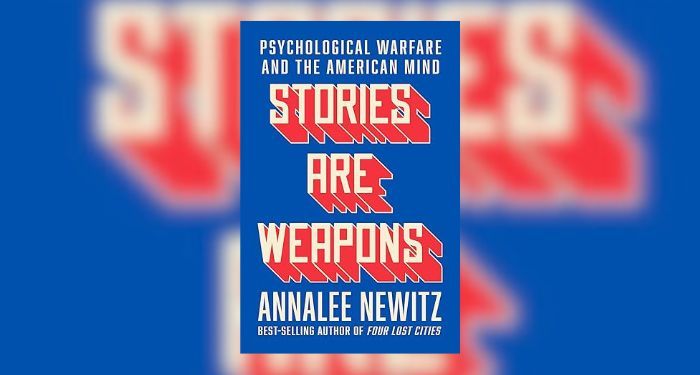Stories can be a lot of things, as journalist and novelist Annalee Newitz writes in “Stories Are Weapons,” but in the end they are powerful instruments that can be used for good or evil, to comfort the afflicted or afflict the comfortable. (Photo: Courtesy bookriot.com)
Source: Library of Congress Blog
August 20, 2024, Posted by: Neely Tucker
Note: “Stories are Weapons” is not available at Branigan Memorial Library; however, several other books by Annalee Newitz are available for both checkout and download.
“The thing about stories is that they are emotional and oftentimes appeal to us on a personal level in a way that is very difficult for facts to do,” she said in a recent phone conversation. “They get used as a great system of conveying information within an emotional shell.”

The subtitle of her 2024 book is “Psychological Warfare and the American Mind,” and she’ll be discussing the subject with British author and journalist Peter Pomerantsev, whose “How to Win an Information War: The Propagandist Who Outwitted Hitler” also came out this year. The two will present “Words at War: Misinformation Then and Now” at the Library’s National Book Festival in D.C. on Saturday, Aug. 24.
Both writers have a modern take on the issue — social media platforms continue to spread disinformation campaigns at lightning speed around the planet, infusing international conflicts and domestic cultural debates with a kinetic, off-balance energy.
“Methods of information warfare that seemed novel in 2016 are now part of our everyday lives,” Newitz, who uses they/them pronouns, writes. The nation has entered a period of “chaotic” terrorism, they observe, when campaigns on social media are designed to trigger someone into violence, but it’s impossible to predict who, when or where or exactly why.
Still, both writers acknowledge that this is a very new wrinkle in a very old game.
“All warfare is based on deception” is one of the most famous passages of “The Art of War,” the Chinese classic attributed to Sun Tzu about 2,400 years ago. Confusing your enemy about where, when and how you’ll attack is essential.
After the warfare is over, conquering nations have always written narratives that portray them as heroes, with their defeated foes as anything from misled enemies to barbaric hordes. They do not, of course, portray themselves as simply more ruthless, better armed and better organized combatants who got lucky on a particular day.
Instead, they create narratives — stories — that they or their cause has been ordained for power by a supernatural deity, or they are higher forms of human beings. These stories become the foundational myths, and very real cornerstones, of societies and civilizations.
Newitz, 55, who writes both science fiction and nonfiction, takes their story of American military psychological operations (“psyops”) from the 19th century forward. “Though World War I was the first time that psychological war was identified as such, the practice of combining propaganda and mythmaking with total war began with the Indian Wars.”
Pomerantsev, who was born in Ukraine and has written several books on propaganda (particularly of the Soviet variety) writes from more of an international perspective.
What’s striking to Newitz is that the American military’s techniques, once deployed at foreign targets, are now being used by domestic political and cultural groups against one another. American psyops moved into official existence in the late 1940s when an intelligence officer named Paul Linebarger wrote a manual called “Psychological Warfare” for the U.S. Army that became so influential that it is still used today.
Newitz observes that Linebarger also wrote science fiction under a pen name and was quite accomplished at “worldbuilding,” or creating a fictional universe that seems complete unto itself.
“The more I immersed myself in Linebarger’s work,” Newitz writes, “the more obvious it became that his skill as a science fiction writer was a crucial part of his success with military psyops. … Linebarger believed that words, properly deployed, were more powerful than bombs.”
Further propelled by the powers of advertising, with its calls to action in a few words or images, such psyops or disinformation campaigns gained new power as they blurred the lines between reality and fiction. In this way, Newitz says, current cultural warfare uses a troika of elements to wage disinformation: scapegoating, deception and threats of violence.
“These weapons are what separate an open, democratic public debate from a psychological attack,” they write.
Still, stories can also be used for greater inclusion and more open societies. Psychologist William Moulton Marston created Wonder Woman for DC Comics in 1941 as “psychological propaganda for the new type of woman.”
The superhero story of Diana Prince was perceived as action-based comic book heroine, not crude propaganda. Still, from Marston’s perspective, his campaign worked beyond his wildest dreams. Today, the character is a pop culture staple.
There are other positive campaigns, Newitz writes, such as the Southwest Oregon Research Project, which shows that local Native Americans did not disappear, as government authorities had long insisted, and that they were still part of the community.
Still, those battles are never fully won, Newitz writes, and won’t be over anytime soon: “… the culture wars over who counts as an American, or even as a human being, are far from over. They return, like repressed memories, to retraumatize us.”





